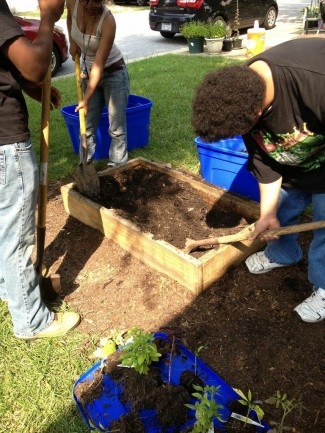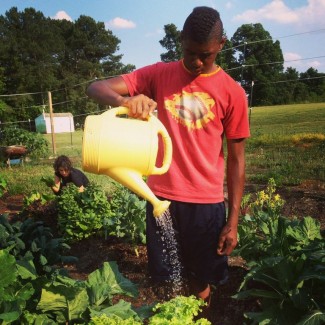 September is Hunger Action Month. Learn more about one of the ways we're "beet"ing hunger - by teaching communities how to grow and prepare their own food and creating greater access to good food - sometimes literally right in their own backyards!
In the community of Parrish Manor last week, three young self-proclaimed “Garden Ninjas” not so surreptitiously built a 4 x8 raised garden bed in front of the park office and planted it with plenty of fall vegetables, herbs, and flowers. This isn’t guerilla gardening, it’s a demonstration garden, and it’s part of a new backyard gardening program beginning there, led by youth garden mentors Kiara, Seth, and Mario.
September is Hunger Action Month. Learn more about one of the ways we're "beet"ing hunger - by teaching communities how to grow and prepare their own food and creating greater access to good food - sometimes literally right in their own backyards!
In the community of Parrish Manor last week, three young self-proclaimed “Garden Ninjas” not so surreptitiously built a 4 x8 raised garden bed in front of the park office and planted it with plenty of fall vegetables, herbs, and flowers. This isn’t guerilla gardening, it’s a demonstration garden, and it’s part of a new backyard gardening program beginning there, led by youth garden mentors Kiara, Seth, and Mario.
Since 2009, Inter-Faith Food Shuttle has worked in the community of Parrish Manor to help start and manage a community garden there, most recently along with the three youth garden mentors, who have spent the last year working at the community garden and learning about agriculture and food preparation. Now, gardening in the community will take a different form – one that is immediate, local, and practical for Parrish Manor residents: personal gardens in their backyards.
The youth garden mentors have created this new raised-bed garden pilot program, called Raise the Roots. After getting feedback from the community about what they wanted to see happen in their neighborhood and about how to increase gardening participation, they came up with a way to support residents in growing fresh, healthy, chemical-free food in their own backyards. It’s a program created by neighborhood youth, in partnership with and support from Inter-Faith Food Shuttle and the Parrish Manor management.
How will the program work?
 Raise the Roots (RtR) will work with interested residents to design and build various sizes of raised garden beds in the residents’ backyards. RrR will provide supplies and materials to get the residents started, all free of charge through this fall and following spring. They’ll also provide free workshops in gardening and food preparation after the planting season to help residents manage and prepare what they grow. The youth garden mentors will do what their name suggests, and provide ongoing support and assistance to the new backyard gardeners.
Raise the Roots (RtR) will work with interested residents to design and build various sizes of raised garden beds in the residents’ backyards. RrR will provide supplies and materials to get the residents started, all free of charge through this fall and following spring. They’ll also provide free workshops in gardening and food preparation after the planting season to help residents manage and prepare what they grow. The youth garden mentors will do what their name suggests, and provide ongoing support and assistance to the new backyard gardeners.
As the youth were working on the demonstration bed in front of the office, a few interested folks were already wandering over and asking about the garden– giving Kiara, Seth, and Mario a chance to practice their pitch and explain the new program.
 While the garden beds will be in individual residents’ backyards, the building of them will be a community effort. In order to receive a garden bed, residents are asked to help build at least 2 other beds in the neighborhood as well. They’re signing up to grow, to learn, and to help other neighbor gardeners as they can.
While the garden beds will be in individual residents’ backyards, the building of them will be a community effort. In order to receive a garden bed, residents are asked to help build at least 2 other beds in the neighborhood as well. They’re signing up to grow, to learn, and to help other neighbor gardeners as they can.
It’s already taking shape as a community project – Thomas, the landscape manager at Parrish Manor, enthusiastically helped out with the build, assisting with leveling and squaring off the lumber for the bed frame and bringing tractor-loads full of compost and leaf mulch to fill it.
Planted in square-foot gardening style with a mixture of direct seeding and transplants, the demo bed will now act as a calling card for Raise the Roots.
The rows of red-leaf lettuce, purple mustard, rainbow swiss chard, dinosaur kale, spinach, romaine, cilantro, and parsley aside colorful zinnias are intended to entice passers-bys with its beauty and potential for a delicious, nutritious meal. A sign directs folks to inquire in the office about having one like it built in their own backyards. Each of the youth will also have a similar garden bed in their own backyards that they can show to their neighbors.
Why garden? 
Gardening is a great way to get direct access to healthy, affordable food and empower families to take control of their food choices. With a garden in their own backyard, residents can work in it according to their own schedule, plant what they like to eat, and literally step out their door to reach it. And, it's another way to get in that physical activity!
With a network of food gardeners in the community, the neighborhood can become a landscape that meets the need for healthy, fresh, and affordable food – an asset currently lacking in the food desert where Parrish Manor is located. Raise the Roots hopes to provide opportunities for residents to reconnect with each other and the land, honor the cultural food traditions and practices in the community, and perhaps even provide opportunities for microenterprise. In a few months, after several beds have been built and community members have joined the backyard gardening network, the youth, other community leaders, and program partners will begin planning for how to keep this program going for many years to come. Most importantly, residents can rely on themselves for greater food self-sufficiency and be more in control of their food choices and health. As one youth put it, the program aims to “put fast food out of business!”

The Community and Clinical Connections for Prevention and Health Branch in the N.C. Division of Public Health and the N.C. Public Health Foundation are responsible for the administration of these grant funds, provided by the John Rex Endowment.
To help support and sustain Inter-Faith Food Shuttle's programs like this one that feed, teach, and grow to end hunger hunger in our community, consider donating today or becoming a monthly Ground Level Giver! Together, we CAN "beet" hunger!







 September is Hunger Action Month. Learn how one young woman who works with Inter-Faith Food Shuttle's gardening program in Parrish Manor is taking action to help BEET HUNGER in her community by teaching her neighbors how to grow fresh, healthy food in their own backyards.
Kiara Sanders has always loved to draw. Pencil and ink sketches of people are her favorite pursuits, but she credits gardening for giving her the confidence and the problem-solving skills required to pursue a college degree in art education. “Although art and gardening are different, they both require learning technical skills.”
September is Hunger Action Month. Learn how one young woman who works with Inter-Faith Food Shuttle's gardening program in Parrish Manor is taking action to help BEET HUNGER in her community by teaching her neighbors how to grow fresh, healthy food in their own backyards.
Kiara Sanders has always loved to draw. Pencil and ink sketches of people are her favorite pursuits, but she credits gardening for giving her the confidence and the problem-solving skills required to pursue a college degree in art education. “Although art and gardening are different, they both require learning technical skills.” Raise the Roots (RtR) will work with interested residents to design and build various sizes of raised garden beds in the residents’ backyards. RrR will provide supplies and materials to get the residents started, all free of charge through this fall and following spring. They’ll also provide free workshops in gardening and food preparation after the planting season to help residents manage and prepare what they grow. The youth garden mentors will do what their name suggests, and provide ongoing support and assistance to the new backyard gardeners.
Raise the Roots (RtR) will work with interested residents to design and build various sizes of raised garden beds in the residents’ backyards. RrR will provide supplies and materials to get the residents started, all free of charge through this fall and following spring. They’ll also provide free workshops in gardening and food preparation after the planting season to help residents manage and prepare what they grow. The youth garden mentors will do what their name suggests, and provide ongoing support and assistance to the new backyard gardeners. While the garden beds will be in individual residents’ backyards, the building of them will be a community effort. In order to receive a garden bed, residents are asked to help build at least 2 other beds in the neighborhood as well. They’re signing up to grow, to learn, and to help other neighbor gardeners as they can.
While the garden beds will be in individual residents’ backyards, the building of them will be a community effort. In order to receive a garden bed, residents are asked to help build at least 2 other beds in the neighborhood as well. They’re signing up to grow, to learn, and to help other neighbor gardeners as they can.



